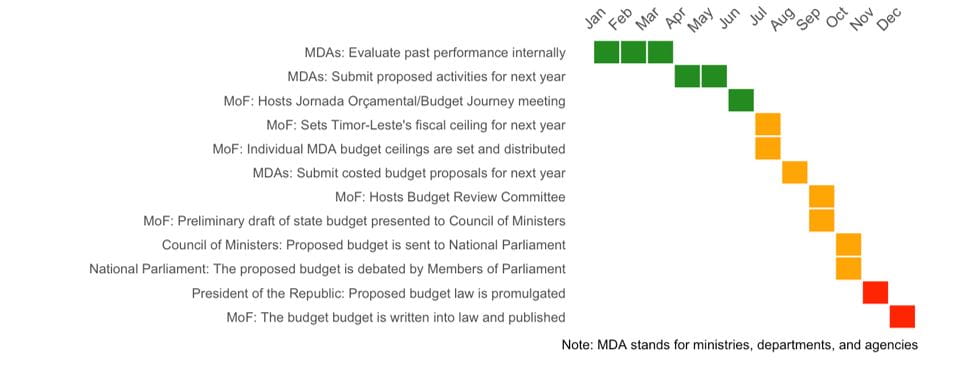Timor-Leste, the world's second-youngest country, saw its Ministry of Education (MoE) secure a remarkable 47% increase in its 2023 budget, reaching its highest-ever allocation ($122.2m) with a doubling of school grants. The MoE’s achievements offer valuable lessons in effective budget advocacy, particularly in understanding how a line ministry should collaborate effectively with the Ministry of Finance (MoF).
Timor-Leste's education sector has significant room for improvement, with poor outcomes for the majority of the 392,043 students in the education system and many other out-of-school children. A 2017 Early Grade Reading Assessment (EGRA) revealed that over 70% of Grade 2 students received a zero score on text reading, fluency, and comprehension.
MoE critically assessed its financial positioning ahead of the 2023 budget process, where the exercise revealed a chronically underfunded education system. The proportion of public expenditure on education followed a declining trend, having fallen to 13% in 2014 to just 4% in 2022.
In the intricate world of government finance, timing is everything. Budget formulation, particularly in the first half of the fiscal year, offers the most significant opportunities for influence. Strong advocates (politicians, development partners and other influential figures) can help build the case in public forums and closed rooms at later stages. The decision-making calendar is shown in the chart below.
Having sight of these opportunities is critical to reaching a successful outcome. However, in reality, ministries commonly demand additional funding after the budget is passed - a reactive approach that consistently falls short.
The budget process at the MoF is generally not well understood. From the line ministry’s perspective, proposals are submitted, and a few months later, there suddenly appears an allocation. Inevitably, a cacophony of questions regarding unfunded priorities arises, although by this point the key opportunities for engagement have already passed.
Timor-Leste’s MoF, oversees a state budget of over two billion dollars and is responsible for over a hundred line ministries, municipalities and autonomous agencies. Data and evidence-based justifications form its decisions, but key information is frequently omitted for one simple reason: the data have not been shared with MoF.
Addressing these critical barriers of information asymmetry and contextualizing the budget requests were key contributors to MoE’s success. MoE sought to enrich the pool of evidence for MoF decision-makers early in the budget cycle, by providing an evidence pack consisting of key data from its internal Education Management Information System (EMIS), alongside a compendium of country-specific research and the Ministry’s major achievements.
Line ministries should recognize that there is often a goldmine of evidence available through internal monitoring and evaluation efforts, which can inform and justify budget proposals – but it must be used for it to have any impact.
Proactive efforts to strengthen the working relationship between the two ministries also facilitated the advocacy process. Prior to the ‘Jornada Orçamental’ (Budget Journey), a meeting which determines the fiscal ceiling and key priorities for the following year, MoE secured an extraordinary meeting with MoF. Attended by its senior leadership team, it provided a holistic overview of the sector and its needs, reframing the conversation around scale and impact: the 392,043 students, representing a third of Timor-Leste's population and its future workforce.
The presentation from the MoE focused on its proposed programs, with detailed costing scenarios, and the implications for service delivery – not in percentages, but in the number of students educated, teachers trained, and schools built. The MoE also provided analysis for the MoF, demonstrating its internal capacity – for example, a high budget execution rate between 96-98% between 2018-2021. Acknowledging existing budgets were heavily weighted to salaries and wages, the MoE specifically requested additional non-salary funds to implement activities targeting learning outcomes, and tangible improvements for schools.
The MoE also highlighted specific funding priorities which were rejected by MoF previously – namely capital development. In 2021, the entire $7m capital development request was removed from the education budget, and for 2022 the capital development budget was reduced by over 50%, with $5.0m approved from a $10.1m request. The MoE brought its requests to life by highlighting specific schools needing renovation, including one near the MoF itself. Subsequently for the 2023 budget, MoE received $15.1m for capital development, based on its proposed schedule of works submitted in the data pack.
Of course, in any relationship, there is give and take. Beyond the typical request for additional funds, the MoE took a further step to assess its own capability for savings and better governance. It demonstrated its commitment to improvements, through a promise of identifying efficiency savings totaling $2.6m through a reduction of superfluous spending on local travel and workshops amongst other activities. Furthermore, a review of virements and transfers was conducted, leading to a joint decision to create internal guidelines to improve future execution and governance. This highlighted a new level of collaboration with the MoF.
Following the MoE’s presentation, the turning point came with a revealing comment from the National Director for Budget at MoF: "This is the first time you [MoE] have presented a financing case to us in seven years.".
The lesson is clear: line ministries must engage early, maximize the impact of its internal data, and foster a collaborative relationship with the MoF.
Perhaps most tellingly, the Director General of Planning and Budgeting, MoF, ultimately asked: "How much do you need to fix the education system in the next three years?" – an indication of how effective advocacy can shift the conversation from incremental changes to transformational solutions.







